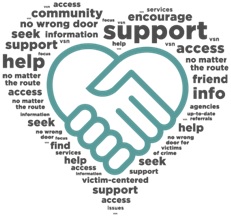Coping Strategies
Coping Strategies
Speaking to a professional about your experience and/or feelings in the aftermath of trauma can help reduce long-term effects. The healing process can be slow and is different for every individual. It is important to try and avoid negative coping strategies, which can be done by accessing the supports available through community organizations. For further information please see the resource section.
Positive Coping Strategies
- Accept your feelings
- Activism
- Become trauma-informed
- Collect information
- Engage in activities to regain control
- Prioritize yourself
- Seek support
Negative Coping Strategies
- Avoidance
- Denial and self-deception
- Dissociation
- Obsessing about the crime
- Self-harm
- Substance misuse

